#Ancient Egyptian religion
Text
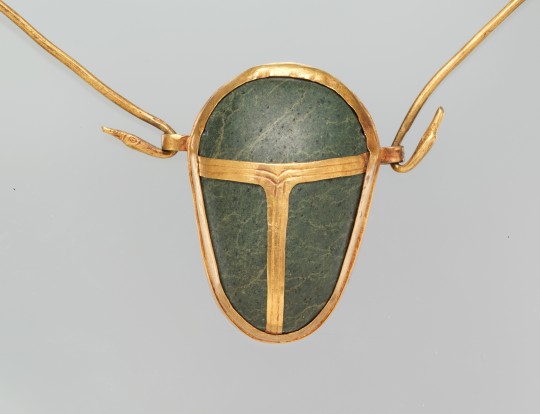
Ancient Egyptian heart amulet (gold and green schist) of one Manhata. Artist unknown; ca. 1479-1425 BCE (reign of Thutmose III, 18th Dynasty, New Kingdom). From the Tomb of the Three Foreign Wives of Thutmose III at Wadi Gabbanat el-Qurud, Thebes; now in the Metropolitan Museum of Art.
#art#art history#ancient art#Egypt#Ancient Egypt#Egyptian art#Ancient Egyptian art#Egyptian religion#Ancient Egyptian religion#kemetic#Thutmose III#18th Dynasty#New Kingdom#jewelry#jewellery#pendant#amulet#metalwork#gold#goldwork#schist#Egyptian Thebes#Metropolitan Museum of Art
684 notes
·
View notes
Text
another very important Egyptology poll everyone!
595 notes
·
View notes
Text
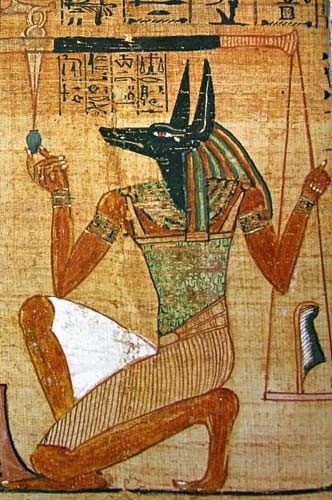
#Anubis#Egyptian gods#Ancient Egyptian#god of funerary rites#protector of graves#underworld#ancient Egyptian religion#canine#man with a canine head#ancient civilizations#art#gods
146 notes
·
View notes
Text

Nehebkau (also spelled Nehebu-Kau) was the primordial snake god in ancient Egyptian mythology. Although originally considered an evil spirit, he later functions as a funerary god associated with the afterlife. As one of the forty-two assessors of Ma’at, Nehebkau was believed to judge the deceased after death and provide their souls with ka – the part of the soul that distinguished the living from the dead.
Nehebkau was ultimately considered a powerful, benevolent and protective deity. In late mythology, he is described as a companion of the sun god Re and an attendant of the deceased King. As he is so closely associated with the sun god, his name was evoked in magical spells for protection. His festival was widely celebrated throughout the Middle and New Kingdoms.
#gods of egypt#egyptian god#egyptian gods#египетские боги#ancient egyptian religion#ancient egypt#vector art#god of egypt#Nehebkau#Нехебкау
69 notes
·
View notes
Note
Oh? How normal are we about Pharaoh Cub?
Okay look. You gotta understand. I've been interested in ancient Egpyt since I was a kid. It's my longest-running special interest/hyperfixation, so much so that I've been practicing ancient Egyptian religion for over twenty years. It's something that's very, very precious to me, bc it's so personal to me, and bc I'm who I am, my knowledge of this stuff is arguably higher than the average person. This makes any kind of media about ancient Egypt actually not that interesting to me bc my brain will Not shut up about inaccuracies, so I tend to avoid them bc of that.
(I could go on about my issues with ancient Egyptian themed media, but I won't, that's a whole 'nuther essay frfr.)
(Also I hope you like infodumping, anon, bc that's what I'm about to do :D)
That said, I've actually written a whole lot of Egyptian myth rewrites, as well as ancient Egyptian stories exploring all kinds of various topics. I have some published on an old blog of mine, but some I never finished for various reasons. It's a whole thing. It's been a whole thing for me for a very, very long time.
So, you're me, someone with a more than average knowledge of and interest in ancient Egypt, and you've just become a Cub fan in s8 bc that was my first Hermitcraft season. I had heard about the pyramid, and Pharaoh Cub, and I was both SO INTERESTED but also actually quite hesitant to watch Cub's s7, bc I didn't want to be disappointed if he messed it up or did something wrong that caused my brain to Disagree. Again, very irrational bc my brain do be like that, but also based on previous experiences of seeing ppl just taking the aesthetics and doing whatever with it, and screw historical accuracy.
(Honestly, this is, like, my One (1) critism with the lore TrixyBlox built into the USW map. Can we Not have evil pharaohs plz just for once. ;_;)
I wanted to trust Cub, bc I'd seen the research that went into the canyon build. He's a smart dude. He cares about getting those kinda details right. And I did genuinely want to see how he approached the pyramid build and how he was going to use it as a base. But again, SO HESITANT. bc what if my blorbo messes it up and ruins the whole thing for me bc m brain is Stupid about this sort of thing. ;_;
But I'm so glad I trusted Cub when I did get around to watching s7, bc I fell in love with the pyramid. The fact that he cared about making it as life-size as possible, but also that he took an approach of taking what works, but also making it his own, and making it fit into the minecraft world. Like, using Standard Galactic for hieroglyphs! I loved that small little detail! It makes so much sense to use it that way.
Like, my very-not-srs gripes about the Pharaoh skin and its weird sleeves aside, his approach was very much how a lot of Egyptian pagans approach things today. Take what works, or what makes sense, and adapt it to where we currently are in the world and what we have access to. And I could tell from how he talked about it throughout the season that he really had done his research. And just- The Morning and The Evening Sun/Star epithet he gave himself like!!!!
Like, it's the little things, like the lapis roof, the stars - including Sirius!, the most important one bc its rising heralds the flood of the Nile and the new year - on the ceiling in the bedroom, the statue room and the way he built those five statues to represent aspects of himself (I cannot stress enough how much I adored those statues), allll the little tunnels and sekrit passageways, and the cartouche on the wall with his name in SGA and using SGA in the museum room, the treasure room with its traps, and the tomb of the Pharaoh himself. Like. It was such a perfect blend of Cub and Egyptian stuff. 10/10. I can find no faults. Although I do want to go back and finish the oasis room at some point. Make it a healing pool room with a shrine or two in it. Something like that.
Like, I had my doubts, but I trusted Cub and his process, and I was right to do so. It cemented Cub as my favourite Hermit at that point, bc he took my special interest and did it justice. And that's why I'm Very Normal about Pharaoh Cub.
But there are also other aspects too! Pyramids were designed to be tombs, and that's where the Pharaoh was left to rest at the end of s7. Which seems very appropriate, given where Hermitcraft went after that.
The reason I fixate so much on this is that there's this Egyptian underworld book called the Book of Caverns, that describes the King's journey through the underworld. It's not as well-known as the Book of the Dead, but the reason I keep coming back to it is because of Cub's canyon in s8. Where he built everything in little caverns in the canyon itself. And with the change of skin to young Cub, my brain just cannot let go of the idea of s8 being Pharaoh Cub's journey through the underworld, culminating with the final battle against the serpent we do not name so we do not give it power (a/p/o/p/h/i/s) that is here manifested in s8 as Moon Big. It's not a perfect metaphor, and I won't pretend it is. Especially bc while Cub escapes, the world is destroyed, and that's not necessarily accurate. But! He still escapes! He uses all his knowledge and resources that he's gained through his journey through the underworld to escape. To rise again in s9 as the new sun.
AND AND AND the fact that in s9 PHARAOH CUB DID ACTUALLY RETURN. Only now, we have the Pharaoh as a distinct entity. A divine akh/ancestor, a master magician, one who is clever and wiley like Thoth and who loves playing games and playing pranks. (Thoth is a trickster, and a very smart one.) And to have the distinction between Pharaoh Cub, who is a god, and mortal Cub, who is just Cub, like.
(Cub and his possession kink is also a whole 'nuther essay frfr)
That distinction makes sense in an Egyptian theological framework. Once the Pharaoh dies, they become divine akhu/ancestors. Very few were Actually Deified in a way we would recognise, but Cub is still not wrong when he calls the Pharaoh a god. The Pharaoh was a conduit between the people and the gods. He acted as the only high priest of the religion. He became King by hosting the Kingly Ka, the divine soul of Horus that legitimises their rule. This Ka/soul, has been with every king before it, and all the kings are attached/accessed through it. Kings live forever, after all. My own personal religious work has involved various Kings and Queens and working with them. (Not the most famous ones, tho, it's mostly the Sobek ones bc I worship Sobek first and foremost.)(Sobek being a crocodile god, a strong protector, and a god who was incorporated in Horus at one stage and gained Kingship attributes from that.)
And so it makes so much sense for the Pharaoh to be a separate entity now. The old man died, bc Cub is mortal, and ba/eternal soul of Cub was reborn into a new, younger body, with a whole new ka. Everyone has a ka, it is the soul that belongs to a particular lifetime and is the one that goes through judgement after death. The ba is eternal, and can have many kau/souls throughout its existence.
And bc the Pharaoh has died and become an akh, he can be contacted and manifest in the world again through the mortal Cub. The fact that Cub never actually changed the Pharaoh skin to reflect his younger self? It still has the old man's face? Like. This helps the distinction work. They're two different souls. This is theologically sound. And honestly I never imagined the Pharaoh lore would get to that point. But here we are, in s9, and we have the Pharaoh and mortal Cub, and I am Just So Normal about this bc I thought I'd missed my chance at Pharaoh Cub bc I only started watching in s8. BUT NO. s9 came along and is like, would you like some more Pharaoh Cub? and it's eating my brain like. oh my gods.
And also like, the Vex Magic Grimoire I've been working on? Canonically (to me), it's being written by Pharaoh Cub. Once the ConVex and ConCorp shenanigans settled down, and Cub had space to really focus on his magic, that's when he starts working on the grimoire. bc almost all Pharaohs were also master magicians. They had to be! It was part of their work as high priest and conduit for the gods. So Cub has Pharaoh magic on top of Vex magic, and in working through his new powers, decides to start recording down all he knows about Vex magic. Scar does some as well, but it is intended to be mostly Cub.
(I have an ask I STILL have not got around to about the Pharaoh's magic, and I will save a longer discussion for that there. I will get to it, I promise, anon! It's just taken a while to get my thoughts in order. <3)
It's like, in Pharaoh Cub, I can combine my love of writing about Egyptian things with my current hyperfixation on Cub, and it's so much fun omg. Cub doesn't do deep lore the way someone like Sausage does (again, whole 'nuther essay lol), but there's enough there to make a really good story, and build up these aspects of his character and make a really coherent story out of it.
And with Pharaoh Cub, I can explore all kinds of things that maybe don't work with other characters. Like death! In a way that doesn't really happen in minecraft bc players just respawn. Permanent death is something I've really only encountered on Empires, not Hermitcraft. But with the Pharaoh dying and being laid to rest in his pyramid? Like. That's something to work with. There's lore there to explore. Old Man Cub coming to terms with dying and what happens afterwards. and bc like. idk if anyone has actually ever written Old Man Cub as an actual Old Man. But as someone who's approaching 40, and has their own chronic pain stuff to deal with, like? Maybe I see it differently. Maybe I want to approach Old Man Cub as an old man. And maybe the Old Man dying as Pharaoh, and being reborn into a younger body is one way to do that.
Sure, it may not be the most popular fics for ppl. Maybe ppl are more interested in my other works. But I don't care. It's all my special interests in one place and I'm having the time of my life. :D
Even if I STILL don't know what to do with the journey through the afterlife!s8 caverns idea. Maybe one day I will find the right spark to do that idea justice. <3
#convexical asks#hermitcraft#convex#cubfan135#gtwscar#pharaoh cub#old man cub#young cub#fanfic#cub's pyramid best pyramid#ancient egyptian magic#ancient egyptian religion#devotional writing#mythfiction#this is a lot of infodumping#but i hope it helps explain things
61 notes
·
View notes
Text
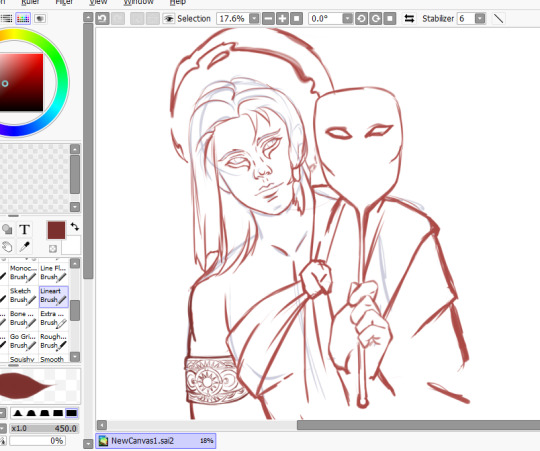

A sketch for my second Shadow Theater blog.
My interpretation of the Solar Eclipse. The next one will be August 12, 2026, this is a reason to go to Spain.
Glory to the great and wonderful Lord Ra!
#galgannet#Gods of Egypt#ancient Egyptian religion#egyptian gods#Sun disk#Ra#Ра#боги египта#Ancient Egypt#Solar Eclipse#the sun#Eclipse#God Ra#Lord Ra#sketch#kemetism
7 notes
·
View notes
Text

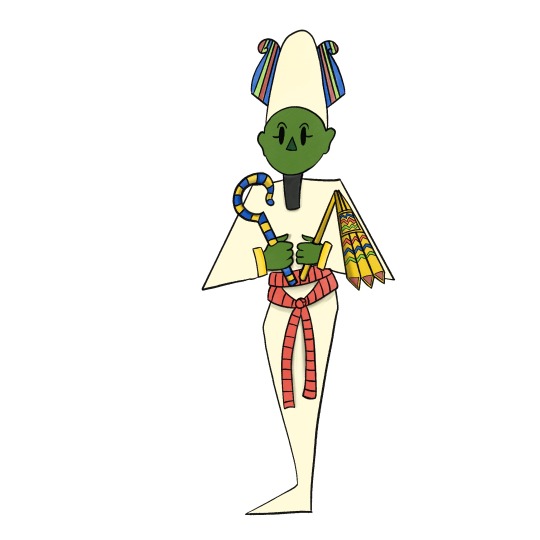
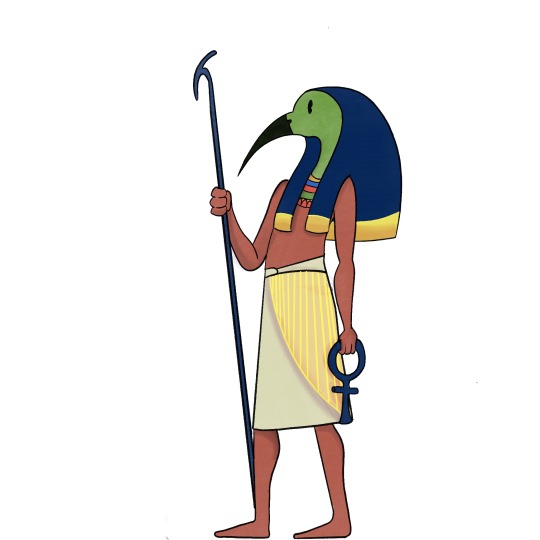

You can find these stickers on my redbubble!
#artists on tumblr#my artwork#illustration#artwork#art#digital art#my art#animation#illustrator#digital practice#artillustration#gothic#witch#kemetism#lord anubis#Lady Hathor#ancient egyptian mythology#ancient egyptian gods#ancient egyptian religion#ancient egyptian art#Hathor#thoth#paganblr#paganism#paganart#pagan Egyptian#occult#occulltism
119 notes
·
View notes
Text
Horus and Pharaohs
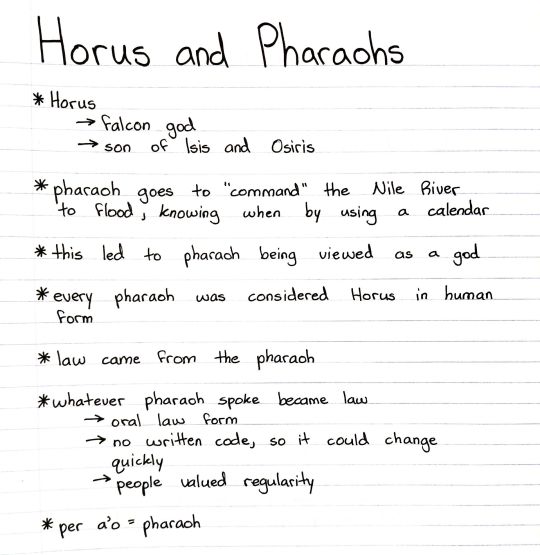
Patreon
#studyblr#notes#history#history notes#historyblr#world history#world history notes#western civ#western civ notes#western civilization#western civilization notes#western civ 1#western civ 1 notes#western civ I#western civ I notes#horus#pharaohs#ancient egypt#egyptian pharaohs#per a'o#ancient egyptian religion#ancient egyptian mythology#nile river#osiris
2 notes
·
View notes
Text
Anubis
Anubis : is the god of death, mummification, embalming, the afterlife, cemeteries, tombs, and the Underworld, in ancient Egyptian religion, usually depicted as a canine or a man with a canine head.

9 notes
·
View notes
Text
Herodotus on Osiris and Dionysus

Statue of Osiris from the Late or Ptolemaic Period. Source: https://www.metmuseum.org/art/collection/search/570654
“Raquel Martín-Hernández
Herodotus’ Egyptian Dionysos. A Comparative Perspective
1 Introduction
The religiosity of Herodotus and how he spoke in his Histories about religion and the different rituals performed by people from other countries have been subject of a great number of scientific works.1The historian offers quite a complete description of religious traditions, rituals and myths in his report of each culture that he speaks about, even when he affirms that the divine and religion have nothing to do in his account of the human affaires.2
For Herodotus, like for the rest of his compatriots, Egypt was the cradle of religious wisdom and for this reason he established several polemic assertions pointing out the debt of the Greeks to the Egyptians on religion matters.3 He also includes in his logos Aigyptiakos a very complex narration about Egyptian chronology to distinguish the world of the gods and the human world in order to focus his study. For that reason this book is full of references to the beliefs and religious practices of Egyptians. This feature has carried out a great number of articles, written by classicists and by historians of religion, focused in various specific fields of expertise. The articles debating the treatment of the religious beliefs by Herodotus, the different rituals performed by Egyptians in honour of Osiris, and the identification of this god with Dionysos rank in a special position.
There is a particular feature concerning the way Herodotus speaks about ritual in Egypt which has provoked some interest among the scholars: the prudence of Herodotus when he speaks about Egyptian rituals performed in honour of Osiris and his deliberate omissions in the second book. However, a great part of these studies do not take the Egyptian sources into consideration. The Greek sources received much more attention than the Egyptian ones, and Plutarch’s Isis and Osiris has played a key position in them. But we have to keep in mind that this book was written 500 years after the visit of Herodotus to Egypt and, in the words of Casadio,4 Plutarch
raccoglie i fili de questa tradizione, confermandone le linee di tendenza, ma dando a essa un tono e una coerenza particolari, in ragione della sua più raffinata sensibilità di teologo e di storico delle religioni.
We must also notice that the work Isis and Osiris was written around 120 AD, more than 300 years after the Ptolemaic reform of the Dionysian cult. The Egyptian rulers, especially since Ptolemy IV Philopator, developed the common features between both gods (Dionysos and Osiris) and their rituals.5
In my opinion, in order to obtain a better comprehension of the Egyptian rituals celebrated in honour of Osiris in Herodotus’ time, it is important to take into account both Egyptian and Greek sources, and all the information of the Egyptian religion that we can retrieve from archaeology and other disciplines.
2 The Silence of Herodotus and the Religious Taboos
As I have pointed out there are several works studying the religiosity of Herodotus and his reservations on revealing religious details: the so called Herodotean omissions or silences.6 On my study I will focus my attention only on the passages in which Herodotus does not even pronounce the name of Dionysos or Osiris.These fragments will be related with other passages in which the name of the divinity is pronounced, but Herodotus avoids speaking about the ritual claiming that there is a hieros logos in which the ritual is explained.
The passages to analyze are the following:7
1) Hdt. 2.86: These persons, when a body is brought to them, show the bearers various models of corpses, made in wood, and painted so as to resemble nature. The most perfect is said to be after the manner of him whom I do not think it religious to name in connection with such a matter; the second sort is inferior to the first, and less costly; the third is the cheapest of all.
2) Hdt. 2.132: Every year it is taken from the apartment where it is kept, and exposed to the light of day –this is done at the season when the Egyptians beat themselves in honour of one of their gods, whose name I am unwilling to mention in connection with such a matter.
3) Hdt. 2.170: Here too, in this same precinct of Athena at Sais, is the burial-place of one whom I think it not right to mention in such a connection.
4) Hdt. 2.171: On this lake it is that the Egyptians represent by night his (sc. Osiris’) sufferings, the so called mysteries.
Thomas Harrison says:8
But, in three of the four instances of the omission of the name of Osiris Herodotus is clear that he only cannot mention the name of the god ‘in connection with such a matter,’ suggestinga distinct reason for omission (albeit we cannot tell what it may have been).
The aim of my work is to offer a possible explanation.
We must notice that in all the occasions in which the historian refuses to pronounce the name of Osiris, identified in other passages with Dionysos,9 the context is funerary.10 In the first text Herodotus is speaking about the mummification of the dead, of which the most perfect and expensive method is the same that was used by Anubis to mummify Osiris.11 In the second and fourth texts the historian speaks about the representation of the sufferings of Osiris12 that was performed and remembered in the festival of Osiris-Sokar.13 Finally, in the third text, Herodotus speaks about the god’s grave.
The name of the god Dionysos or Osiris is not always full of religious taboos in the second book by Herodotus. The historian calls the god by his name in several passages,14 but sometimes Herodotus refuses to give details about the ritual associated with the divinity, claiming that there is a hieros logos explaining it. In these passages the author refers only to the ritual:
1) Hdt. 2.47: They do not offer swine in sacrifice to any of their gods, excepting Dionysos and the Moon, whom they honour in this way at the same time, sacrificing pigs to both of them at the same full moon, and afterwards eating of the flesh.There is a reason alleged by them for their detestation of swine at all other seasons, and their use of them at this festival, with which I am well acquainted, but which I do not think it proper to mention.
2) Hdt. 2.48: About the reason why these statues have this big phallus and why is the only part that moves,is said a hieros logos about that.
3) Hdt. 2.171: I know well the whole course of the proceedings in these ceremonies, but they shall not pass my lips.
I think, with many scholars, that Herodotus cannot speak openly on religious matters because of different religious taboos. This is not the place to discuss neither the different explanations for these silences nor the agnosticism of Herodotus or, alternatively, his respect to mysteries.15 I will focus my attention only on the reasons which force Herodotus not to mention the name of Osiris or Dionysos in funerary contexts, and the relation of these reservations with Egyptian and Greek religion, both civic religion and mysteries.
Attending to the Egyptian sources, and as far as I know, the Egyptians did not have any religious taboo in pronouncing the name of Osiris in funerary contest. On the contrary, the name is constantly used in funerary hymns and in many different mythical tales about his death inserted in ritual and magical texts.16 And not only is his name pronounced, but also all his epithets.
Therefore the reason of his silences must be a caution of the Greek historian derived from his religious beliefs or, probably, from the ones of his audience.17 Given the fact that it seems there was no taboo about pronouncing the name of Osiris in funerary contexts, it must be the name of Dionysos the one who had it.
In Greek religion the world of death is full of ritual taboos.18 People have to purify themselves after any contact with the dead, and several literary passages and inscriptions reveal us that the pollution of death could affect also the gods19 and, of course, their sacred places.20 In order to understand the Herodotean qualms we are studying, I think we should understand these texts keeping in mind two different religious reservations: firstly, the fear to pronounce the name of the god in funerary contexts21 and secondly, the reservation to tell sacred stories which can be associated with Greek mysteries.
According to the first religious reservation we can adduce two interesting Greek classical texts which show the same sort of qualm. The first text belongs to the platonic dialogue Menexenus. In this work the philosopher asserts that is not possible to pronounce the name of gods in a moment like this, that is to say, a funerary speech:22
And when she had herself nurtured and reared them up to man’s estate, she introduced gods to be their governors and tutors, the names of whom it behoves us to pass over in this discourse.
The other text I want to point out belongs to the funerary speech written by Demosthenes.23 The text notices that is not convenient to pronounce the name of Dionysos next to a grave:
It did not escape to the Oeneidae that Semelê was the daughter of Cadmus, and of her was born one whom it would be sacrilegious to name at this tomb.24
Paying attention to both texts, we can easily identify a Greek taboo about speaking aloud the name of gods, and probably specially Dionysos, in funerary context and Herodotus, probably, was not indifferent to this taboo.
According with the second religious reservation, we are quite familiar with the reluctance of the Greek authors to reveal something that could be alike the things revealed in the mysteries. Also, we know that a lapse could provoke legal actions, like the one against Alcibiades for parodying the Eleusinian mysteries during a symposium25 or Aeschylus.26
Osiris is the god of the Underworld for all the Egyptian people, but for the Greeks Dionysos is not so commonly related to the Underworld. There is only a minority, the people who follow mysteries, and especially the Orphic doctrines, who believe on the important place of Dionysos in the Underworld. Herodotus must not be indifferent to mysteries and, probably, he was not ignorant to Orphic doctrines as we can see in several passages of his book. But there is an important biographical detail that can connect Herodotus with Orphic mysteries: his stay in the city of Thurii, whose connection with the Orphic mysteries is well known.27
There is also an interesting taboo in Greek religion which is related with both reservations: the use of euphemistic names of chthonic divinities in mysteries.The most famous qualm at this assertion is the well-known formula ἄρρητος κόρη or just κόρη to name Persephone in the texts related to the Eleusinian mysteries and other texts.28 And not only is the name of Persephone avoided in mysteries.The Orphic Gold Tablets, for example, have euphemistic names for addressing the divinities of the Underworld directly:29‘Queen of the Underworld,’ ‘Eubuleus,’‘Eukles.’
Summing up, the texts by Herodotus mentioned above speak about a deep religious sentiment. This feeling forbids him to speak without restraint not only because of the religious taboos common to the Greek civic religion, but also because of the religious taboos concerning mystery religions. Because the god alluded is Dionysos, is connected with funerary rituals, and the rites are not explained because, since is a hieros logos which explains that, we must accept that Herodotus is not speaking about mysteries in general, but very probably about the Orphic mysteries in particular.
3 The Importance of the Identification of the Dead with the God
From my point of view it is especially interesting to consider the first text cited above, the one about mummification. In this passage the silence of Herodotus would be in consonance with the reservations of pronouncing the name of the god near a grave or a dead person, as in the texts by Demosthenes and Plato which were commented above. But I would like to add a detail that could put this text in relation with the second taboo, the one concerning the mysteries: the identification of the dead with the god.
In Ancient Egypt it was only the Pharaoh the one who could become an Osiris after the complex rituals of embalming and mummification. His son ascending to the throne becomes Horus. This belief becomes a model not only for the Pharaoh but to all the people (who performed well the funerary rites) with the passing of time.30
Reading the Coffin Texts and the different Egyptian Books of the Underworld we can notice the existence of two different images of the Underworld. In the first one the dead would spend in the Duat an eternal life like the one spent in life but full of happiness, farming his land and having always something to eat and drink. In the second vision, the one in which we can observe an assimilation of the Osiris myth with the solar voyage through the Underworld, the dead becomes an Osiris.
The travel of the dead through the Duat is explained in the Book of the Dead and in the Book of the Duat after the XVIII dynasty (1550–1295 BCE). In the Duat, the deceased has to get around different dangers, is judged by Osiris, and he spends eternity with the god. For such a privilege the dead must have a personalized Book of the Dead, which is buried with him. This book explains how to avoid all the dangers and how to respond to Osiris for obtaining the privileged afterlife.The parallels with the Orphic vision of the Underworld (in the gold tablets and some other texts) have been already pointed out by some scholars.31
There are Egyptian texts, very ancient and with a long life, in which the dead is called Osiris. Osiris-NN appears in the Coffin Texts, in the Book of the Dead32 and, with the course of time, in mummy bandages and mummy masks, which carried a lot of ritual formulas taken from the Book of the Dead.33 So the name of he dead written like Osiris-personal name of the dead is a very normal feature in Egyptian funerary custom, and it should be very well known by the priests who informed Herodotus about the whole process of mummification.
In the Greek world and, especially in the Orphic sphere, something similar takes place. Several Orphic texts reveal that the dead belongs to the divine lineage and becomes a hero. The divinization of the dead in the gold tablets from Thurii is quite clear:34 ‘you have become a god instead of a mortal’ o r‘you will be a god instead of a mortal’ or ‘I also claim to be of your happy race.’35 Such localization leads us to the information about Herodotus as citizen of the town and, probably, one of the founders of the colony, as I have pointed out above. It would not be impossible to think that the Orphic ideas revealed in the Thurii tablets were known by him.
There are more texts close to the texts inscribed in the Thurii tablets. The Hipponion tablet speaks also about the divinization of the dead. In this gold tablet the name bacchoi is applied to the dead:36
And you, too, having drunk, will go along the sacred road on which other glorious initiates and bacchoi travel.
Close to this text is the famous sentence by Plato ‘many are the thyrsus-bearers, but few are the bacchoi.’37
All these texts show that the mystai considered that their souls will be later integrated into a community of ‘the chosen”, eventually becoming heroes, and naming themselves bacchoi, as the god is named. I consider that naming the dead with the name of the god of the Underworld or a derivative of it in both funerary beliefs is an interesting coincidence not taken into account in the studies which compare both religions in Herodotus’ second book. On the other hand, I think this is an attractive feature to be added to others to understand Herodotus’ thoughts about the Egyptian funerary tradition and his ‘Greek translation’of it.
4 To Conclude
The revised passages of the Histories by Herodotus make me think that the relation, and later assimilation, between Osiris and Dionysos relies more on the funerary ritual and the special relation between the god and death than on the mythical stories concerning both divinities. I believe that the hesitation that Herodotus felt when speaking about the death of Osiris was based on two main points. The first one is the Greek taboo of pronouncing the name of a god in a funeral context. The second one has to do with the fear of the historian to reveal any small connection between the rites he describes and the world of the Greek mysteries in general and the Orphic ones in particular. The identification of a man with the god of the Underworld after death, and the adoption of the name of the god or an epithet used by the god instead of the personal name of the deceased, might add to other coincidences already noticed by scholars to explain the Herodotean identification of Osiris and Dionysos and the Egyptian and Orphic beliefs.
Raquel Martín Hernández Herodotus’ Egyptian Dionysos. A Comparative Perspective in A. Bernabé, M. Herrero, A. I. Jiménez and R. Martín-Hernández, Redefining Dionysos, Walter de Gruyter, 2013, pp. 250-261, 2013
On line source (with notes and bibliography): https://www.academia.edu/3806976/2013_Herodotus_Egyptian_Dionysos_A_Comparative_Perspective

Raquel Martín-Hernández, Universidad Complutense de Madrid, is Spanish Classicist and Papyrologist .
5 notes
·
View notes
Text
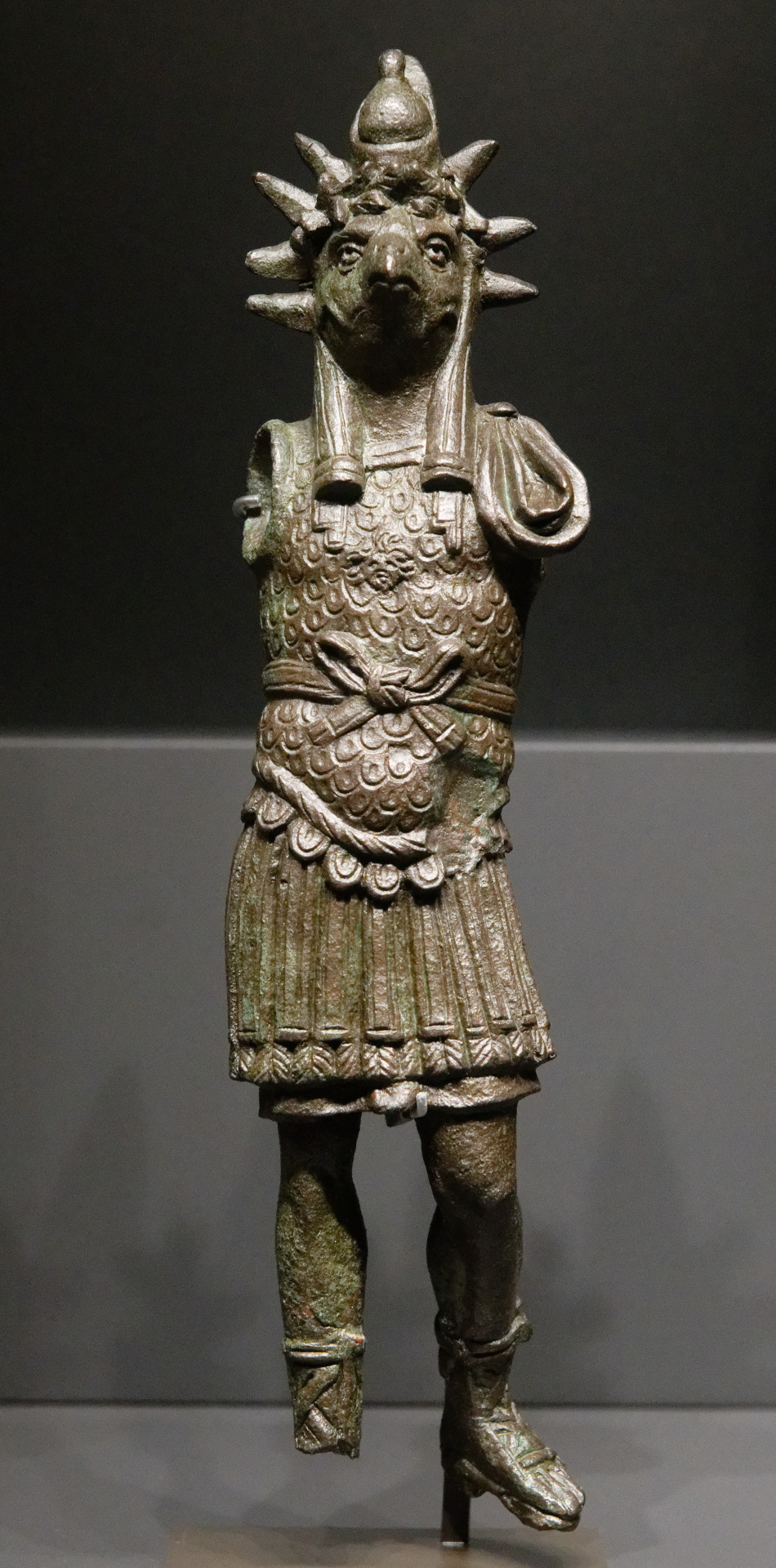
The Egyptian deity Horus as a Roman emperor. The figure bears the falcon-head of Horus, topped by the characteristic double crown (pschent) of Egyptian pharaohs, but also wears Roman armor (specifically lorica squamata, consisting of metal scales sewn to a fabric backing) with a small gorgoneion. Artist unknown; 2nd cent. CE. Now in the Louvre. Photo credit: © Marie-Lan Nguyen / Wikimedia Commons /
CC-BY 4.0
#classics#tagamemnon#Ancient Rome#Roman Empire#Egypt#Ancient Egypt#art#art history#ancient art#Egyptian art#Ancient Egyptian art#Roman art#Ancient Roman art#Roman Imperial art#Roman Egypt#Romano-Egyptian art#Horus#Egyptian religion#Ancient Egyptian religion#kemetic#syncretism#sculpture#statuette#figurine#metalwork#bronze#bronzework#Louvre#Louvre Museum#Musee du Louvre
1K notes
·
View notes
Photo
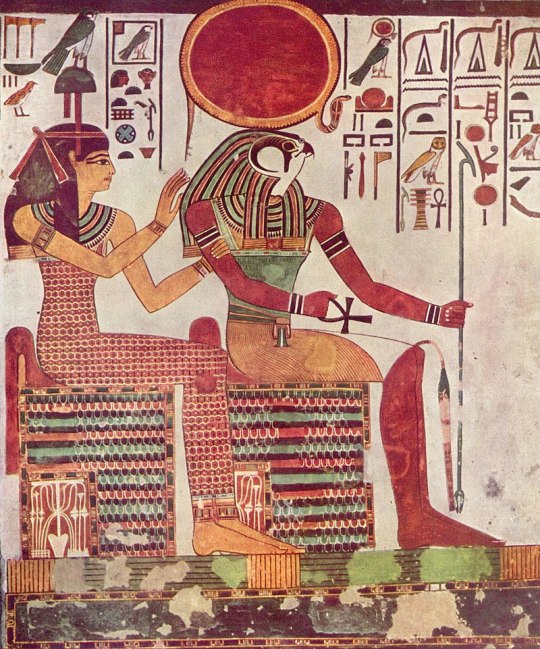
Imentet and Ra from the tomb of Nefertari, 13th century BC
#Imentet#Ra#Tomb#ancient egypt#nefertari#13th century#ancient monument#ancient#egypt#goddess#God#ancient Egyptian religion#Symbols and objects#Egyptian queen#Nefertari Meritmut
300 notes
·
View notes
Text
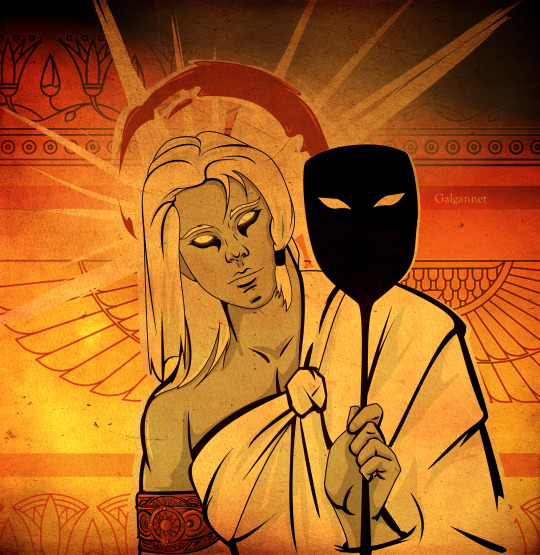
My interpretation of the Solar Eclipse. The next one will be August 12, 2026, this is a reason to go to Spain.
Glory to the great and wonderful Lord Ra!
#Gods of Egypt#ancient Egyptian religion#egyptian gods#Sun disk#shadow theater#shadow play#Ra#Ра#боги египта#Ancient Egypt#vector art#vector illustration#Solar Eclipse#the sun#Eclipse#God Ra#Lord Ra
15 notes
·
View notes
Text

Bastet
0 notes
Text

Oh beautiful Mert,
You walk arm in arm with your husband,
Great sovereign of the Nile!
Lord Hapi!
Your dances conquered his heart!
The bloom of the divine Lilly is
Like your love.
Glory!
Glory!
Let the images of your names
Be kept in the souls of mortals
In the eternity of the world.
О прекрасная Мерт,
Под руку ты идешь с мужем своим,
Великим владыкою Нила!
Лордом Хапи!
Танцы твои покорили, сердце его!
Лилий божественный цвет
Подобен вашей любви.
Славьтесь же!
Славьтесь!
Пусть образы ваших имен
Души смертных хранят,
В вечности мира.
#Nile#Egyptian dancer#dancing girl#Mert#Meret#goddess of egypt#gods of egypt#egyptian gods#ancient egyptian religion#ancient egypt#Hapi (Nile god)#Hapi#Хапи#древний египет#бог нила#romance#husband and wife#Kemetism#galgannet
7 notes
·
View notes
Link
Chapters: 1/1
Fandom: Ancient Egyptian Religion
Rating: General Audiences
Warnings: No Archive Warnings Apply
Relationships: Isis/Osiris
Characters: Isis [Ancient Egyptian Religion]
Additional Tags: Drabble, Sibling Incest
Summary:
Isis knows love is stronger
0 notes